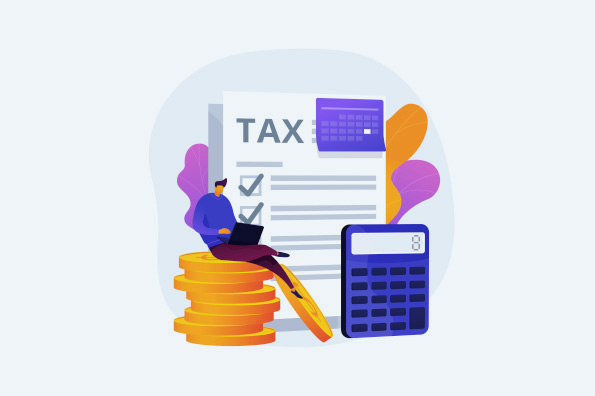Does Your Business Need a Public Safety Permit?
If your business poses a potential safety risk, you may be required to obtain a Safety Permit. Safety risks can range from handling chemicals to...
5 min read
 Chris Daming, J.D., LL.M.
:
Aug. 3, 2024
Chris Daming, J.D., LL.M.
:
Aug. 3, 2024
You need a seller's permit if you need to collect sales tax. You need to collect sales tax in certain situations where you're selling goods or services. So then the question is -- when do I need to collect sales tax? Let's use this 4-step process to find out.


Legal GPS Pro
Protect your business with our complete legal subscription service, designed by top startup attorneys.
Where are the customers that are purchasing your product? What state/city are they residents of? Note this and then you'll use it in Step 2.
To decide if sales tax is applicable to a particular transaction, you look to whether you have a nexus with that jurisdiction. Nexus means sufficient physical presence -- i.e. do you have a physical presence, like an employee or a warehouse, in that jurisdiction.
This rule determines if your business is liable for collecting sales tax for sales in a particular jurisdiction even if you’re not registered in it. There are a lot of factors which can create “physical presence” in a particular state. Having an office, an employee, or even temporary business activities will be enough to create it.
Because of the popularity of online sales, several states have enacted laws expanding what nexus is. In those states you may be taxable under the nexus law even if you do not technically have a physical presence.
Compliance Essentials for Every Business Owner
One nexus example is “Click-through nexus”. Your business has click-through nexus with a state in which you have an affiliate who refers customers to your website and receives commission from your sales in that area. You will usually only be required to collect sales tax if the commission credited to the click through website reaches a certain threshold. For example, let’s say you sell clothes in Arizona and your business is not physically present in California. And let’s say the threshold amount differs from state to state.
You have an affiliate in California who makes a reference to your shop through his website and receives commission from your sales. These circumstances might be enough to create “Click-through nexus” between your company and that state. Keep in mind though that there are other affiliates who might not refer through a website nor receive a commission but whose affiliation might trigger the creation of a nexus between you and that state.
The third situation when sales tax is applicable is drop shipping. Drop shipping is a retail method which involves a third party, the shipper. In a drop shipment transaction, the retailer does not have the product in his inventory. He sells the item through his website or via phone. After this, he asks the supplier to ship the item to the end customer.
You can usually find this out by identifying your industry and searching that way. For example, we would search “Software as a Service” or SaaS when trying to identify what sales taxes needed to be collected.
Some services like grooming services or repairs to property can require collection of sales tax, while others like accounting services are often not taxed. Additionally, certain goods may not require sales tax (certain foods or medicines, for example).
Conduct your research in each state on the Department of Revenue website. State governments want to collect sales tax that is owed, and they do a great job educating business owners on required taxes.
Once you’ve determined your need for a sellers permit, you will need to register with the state or states where you will be collecting sales tax. The process is done online on the state’s Department of Revenue website. Once you have obtained your seller’s permit, your corporation will be authorized to collect applicable sales taxes.
|
Example Will sells novelty hats online. He organized his company in Delaware because he heard that there is no sales tax there. But his goods ship from San Francisco, where his office and warehouse is. |


Legal GPS Pro
Protect your business with our complete legal subscription service, designed by top startup attorneys.
All parties involved can be from different states and it can be difficult to decide what tax rules should be applied. The main problem in this situation is to identify sales tax nexus. There are four possible situations. When both retail and supplier have nexus in a particular state, the retailer is responsible for collecting sales tax. The same rule applies in case when only the retail has nexus in that state.
On the other hand, in a situation when only supplier has nexus, he becomes responsible for sales tax and will therefore collect from the retailer. Consequently, the supplier will collect sales tax for the transaction between him and the end customer.
The retailer can avoid sales tax by using the exemption given to resale. If you do business like the retailer here, be sure to secure the required documentation so you can properly avail of the exemption. In general, tax rules related to drop shipping differ from state to state, especially those related to supplier taxation. States like California, Nevada, Massachusetts or Wisconsin will impose taxation, but there are other states which don’t tax the supplier in such situation.
Finally, when both retailer and supplier don’t have nexus, the customer is responsible for paying the use tax if the state law there imposes it. For example, if your business is located in Illinois, the supplier is from Virginia and you sell a product to the customer from North Carolina, neither you nor your supplier will be liable for sales tax. In this case, the customer will be the one who pay use tax for the product he bought. (of course, almost no customer actually does this).
Also worth noting is that if you have a nexus, you typically have to register as a foreign entity and vice versa (not always, but often).
The biggest question now is, "Do I need a business lawyer?” For most businesses and in most cases, you don't need a lawyer to start your business. Instead, many business owners rely on Legal GPS Pro to help with legal issues.
Legal GPS Pro is your All-In-One Legal Toolkit for Businesses. Developed by top startup attorneys, Pro gives you access to 100+ expertly crafted templates including operating agreements, NDAs, and service agreements, and an interactive platform. All designed to protect your company and set it up for lasting success.

Legal GPS Pro
Protect your business with our complete legal subscription service, designed by top startup attorneys.
Table of Contents

If your business poses a potential safety risk, you may be required to obtain a Safety Permit. Safety risks can range from handling chemicals to...

If your business involves any of the following products or services, you’ll need to determine whether a specialty license is required:

1 min read
Your company is official, and you’re ready to begin operations. But you want to make sure you're not missing anything, like licenses and permits.